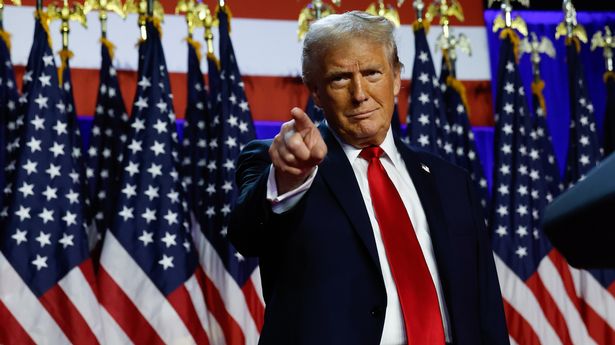Donald Trump has pulled off what few thought possible: one of American history's most spectacular political comebacks.
The polls hinted at it, showing a tight race with the former president holding a slight edge over Kamala Harris. But in truth, he came out swinging for the swing states and dealt his opponent a mortal blow.
He swept the Sun Belt and eked out a lead in the Rust Belt, retracing his 2016 path to victory but with even more impact this time.
Standing in Palm Beach, watching him declare victory in his offbeat way, all while talking about how his return to the White House "will truly be the golden age of America", was quite surreal.
As he spoke, TV pundits looked shell-shocked, faces ashen as the reality began to sink in.
So how did Trump, under legal fire and facing constant controversy, manage a second term? For millions of Americans, he wasn't "crazy" - he was their answer to a crushing cost of living and a Democratic Party that felt out of touch.
Exit polls showed voters prioritising abortion, democracy, and the economy. While Harris led on the first two, Trump's strong economic policy reminded voters of the boom years before Covid-19, with low unemployment, a soaring stock market, and ultimately more money in their pockets.
Under Joe Biden, Americans struggled with inflation, rising costs, and an administration that seemed bogged down by crises.
From Afghanistan's chaotic withdrawal to the ongoing conflicts in Ukraine and Israel, the Democrats seemed weak and distracted by cultural skirmishes, while key domestic issues went unaddressed. The stage for Trump's return was set long before Biden stepped down.
Voters rarely reward incumbents in hard times, and inflation had many ready for a change. Sure, Harris gave the Democrats a boost, but she entered the race without a clear plan, hoping she could coast on likability. Her message to "end the drama" sounded hollow. And her portrayal only added to her challenges.
Enthralled by Harris, her campaign missed the fact that her appeal wasn't universal. Her campaign's excessive "Mamala" hype backfired, alienating the voters they aimed to attract. People saw through the sentimentality.
Meanwhile, Trump ran a surprisingly disciplined campaign when it came to policy. Sure, he tossed out his usual provocations - claims that people's pets were being eaten by immigrants did him no favours in certain circles - but he stuck to key points: Democratic mismanagement, Republican renewal, and a reminder of better times.
Even his court appearances became a tool for fuelling his anti-establishment image. His base, now used to his style, rallied even harder as media attention around his alleged crimes numbed any remaining shock value.
Oddly enough, he's assumed the role of a veteran statesman - not by changing, but by enduring. His coalition, once seen as a fluke, is now a real force that could reshape politics for years, backed by Republican dominance in the House and Senate.
The history books will look back on this election and see the signs that were there all along.
For many, Trump was an effective president. Biden disillusioned them; Harris seemed out of touch. Given these choices, they brought the former president back.
Once again, America has proven it loves a comeback, and Trump's will go down as one of the most improbable in modern history.
